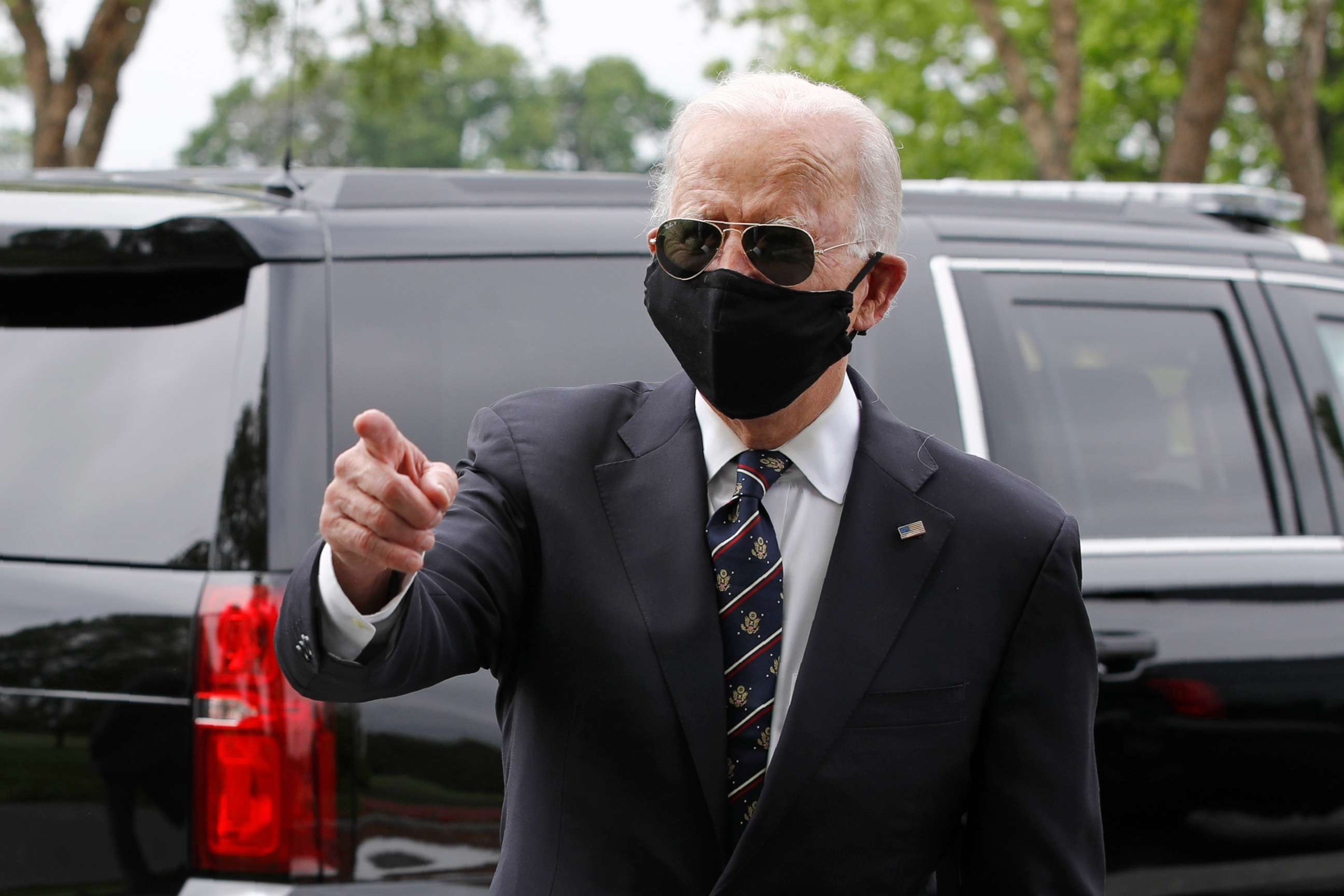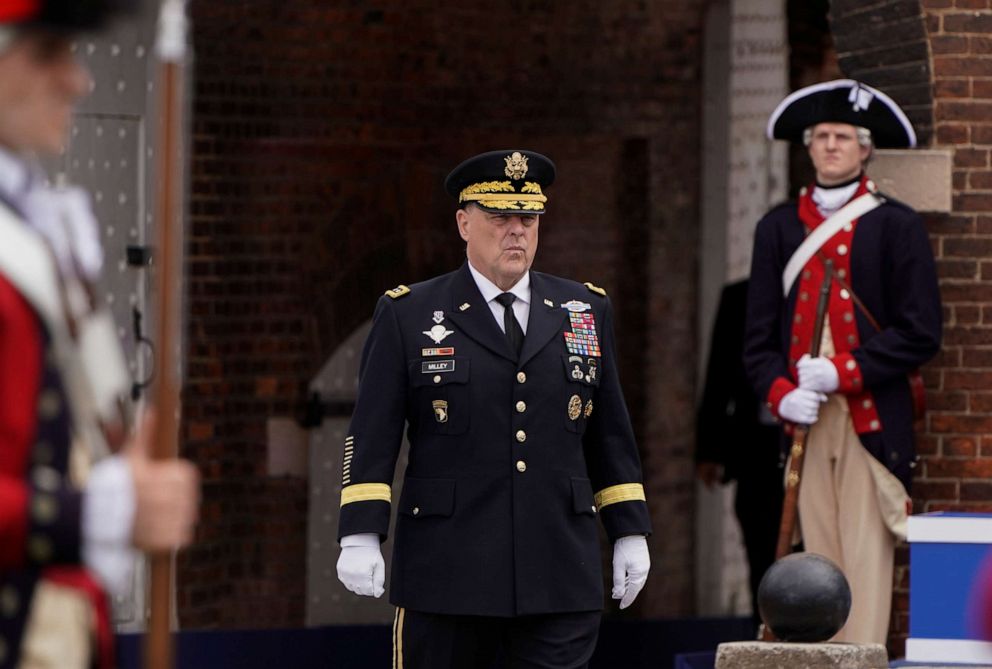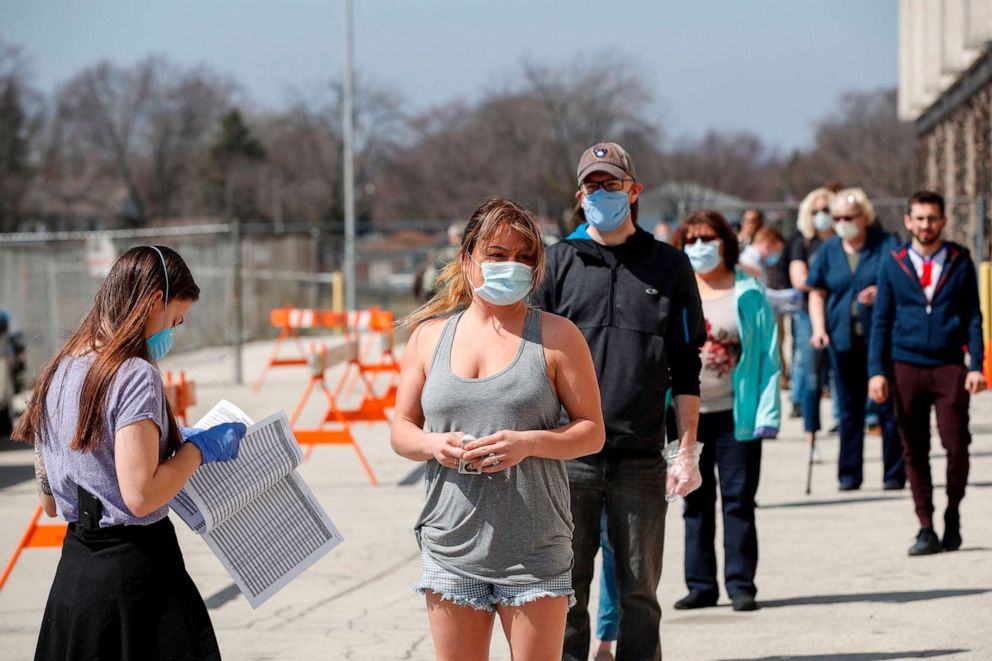The Note: Biden finds a voice – with a mask on
The contrasting images of the week may speak louder than any interviews.
The TAKE with Rick Klein
This week saw a city on flames amid racial tensions, a horrific milestone in the worst pandemic in a century, and a self-described "wartime president" declaring war on Twitter -- following a wild stretch of presidential tweeting.
It also saw, for the first time in more than two months, the presumptive Democratic nominee for president emerge publicly. And yes, he wore a mask.
It was perhaps the most powerful statement that former Vice President Joe Biden made this week -- and arguably the most profound statement he has made since COVID-19 struck. It was a gesture that conforms with the Centers for Disease Control and Prevention guidelines and sides with the weight of public opinion as measured in a series of recent polls.

It only matters politically because President Donald Trump has chosen to make it so. The Trump campaign has mocked Biden, following the lead of the president. Biden's campaign embraced the hits: his Twitter -- yes, Twitter -- avatar now features Biden with signature aviators and a black face covering. Masks are also for sale on the campaign website.
It comes as Biden reacts to Trump's attempts to change the subject by keeping his focus on just one big one. His calculation is that COVID-19 has and will dominate all messaging -- and that leadership qualities will emerge out of campaign noise. Biden has taken heat from his own party for not being out more during the crisis. Of course, he's only a week removed from another time when he spoke too much rather than not enough.
But it may be the contrasting images of the week that speak louder than any interviews or even tweets.
The RUNDOWN with MaryAlice Parks
Senior military leaders held a virtual town hall event Thursday to take questions from service members around the world regarding the Department of Defense's next steps and response to the COVID-19 pandemic.
In mid-March, the DOD banned personal travel for all service members in an effort to limit exposure. The department's actions going forward could signal or set the stage for larger plans for reopening and winding down work-from-home across the entire federal government.

Thursday, Chairman of the Joint Chiefs of Staff Gen. Mark Milley said that the DOD is beginning some antibody testing for some units, such as those who man the nation's nuclear triad and quick reaction forces.
"We do intend to incorporate antibody testing throughout the force," Milley said, adding that the goal would be to expand the antibody testing to show if a member of the military had previously had the virus. Milley also said there is an "active discussion" within the Pentagon for giving hazardous duty pay and awards -- unit or individual -- for those who deployed in response to the pandemic.
Late Thursday, a defense official acknowledged to ABC News' Luis Martinez and Elizabeth McLaughlin that the administration has asked the Pentagon for the military’s cooperation with a key summer signpost: preparations for the Fourth of July celebrations in the nation’s capitol. While those expressions of national pride will be different this year because of ongoing coronavirus concerns, they will no doubt carry extra significance as well.
Despite the tug-of-war between states and the federal government, protesters businesses and political parties, Americans are eager these days to honor all heroes -- those in uniform or not.
The TIP with Quinn Scanlan
While Tuesday marks the biggest day of voting since the coronavirus outbreak upended this cycle's calendar, in battleground Pennsylvania, officials are already sounding the alarm for November. Thanks to a bill passed in late 2019, every Pennsylvania voter was already eligible to vote by mail this election, before it was encouraged as a safe voting method amid the pandemic. But that new option has now led to a whopping 1,592% increase in applications to vote by mail statewide.
Lisa Deeley, chairwoman of the Philadelphia City Commissioners office, said the state's largest city has processed an "outrageous number" -- more than 225,000 -- of absentee and vote-by-mail applications. For the general election, she only expects it to be higher, telling ABC News on Thursday there could be as many as 400,000 to 500,000 applications.

In addition to the sheer volume of people now opting to vote-by-mail, the way state law currently stands, these returned ballots can't even begin to be tabulated until poll closing time on election day, although an exception was made for Tuesday, allowing for ballots to begin being processed when the polls open. Even so, in Philly, none of these ballots will be processed until Wednesday.
If canvassing laws don't change ahead of November, "people aren't going to know what happened in this state election night," Forrest Lehman, director of elections and registration in Lycoming County, told ABC News. "There is no way anybody can responsibly call the presidential race in November -- no way at all."
ONE MORE THING
When viewed through a prism of historic inequity, broken government promises and the perspective of what appears to be an apparent willingness to sacrifice black and brown lives all for the sake of patriotic progress -- communities of color worry that efforts to reopen come at a deadly price, according to an ABC News analysis.
BRINGING AMERICA BACK
Elaborate yard designs. Virtual perfume parties. Personalized trace boards to help children learn how to spell. ABC's "Good Morning America" looks at how small businesses are pivoting during the pandemic. Read this story and more by checking out Bringing America Back, an ABC News feature that highlights the day's top stories in economic recovery and medical preparedness amid the coronavirus pandemic.
THE PLAYLIST
ABC News' "Start Here" Podcast. Friday morning's episode features ABC News' Alex Perez in Minneapolis -- he tells us how protests there have turned violent and why other cities are joining in. Then, Temple University professor Marc Lamont Hill explains why he believes we shouldn't view the unrest as "riots." ABC News Legal analyst Kate Shaw explains President Donald Trump's executive order aimed at social media companies. And, ABC News Senior Washington reporter Devin Dwyer highlights how the pandemic has affected those suffering from cancer. http://apple.co/2HPocUL
WHAT YOU NEED TO KNOW THIS WEEKEND
Download the ABC News app and select "The Note" as an item of interest to receive the day's sharpest political analysis.
The Note is a daily ABC News feature that highlights the day's top stories in politics. Please check back Monday for the latest.




